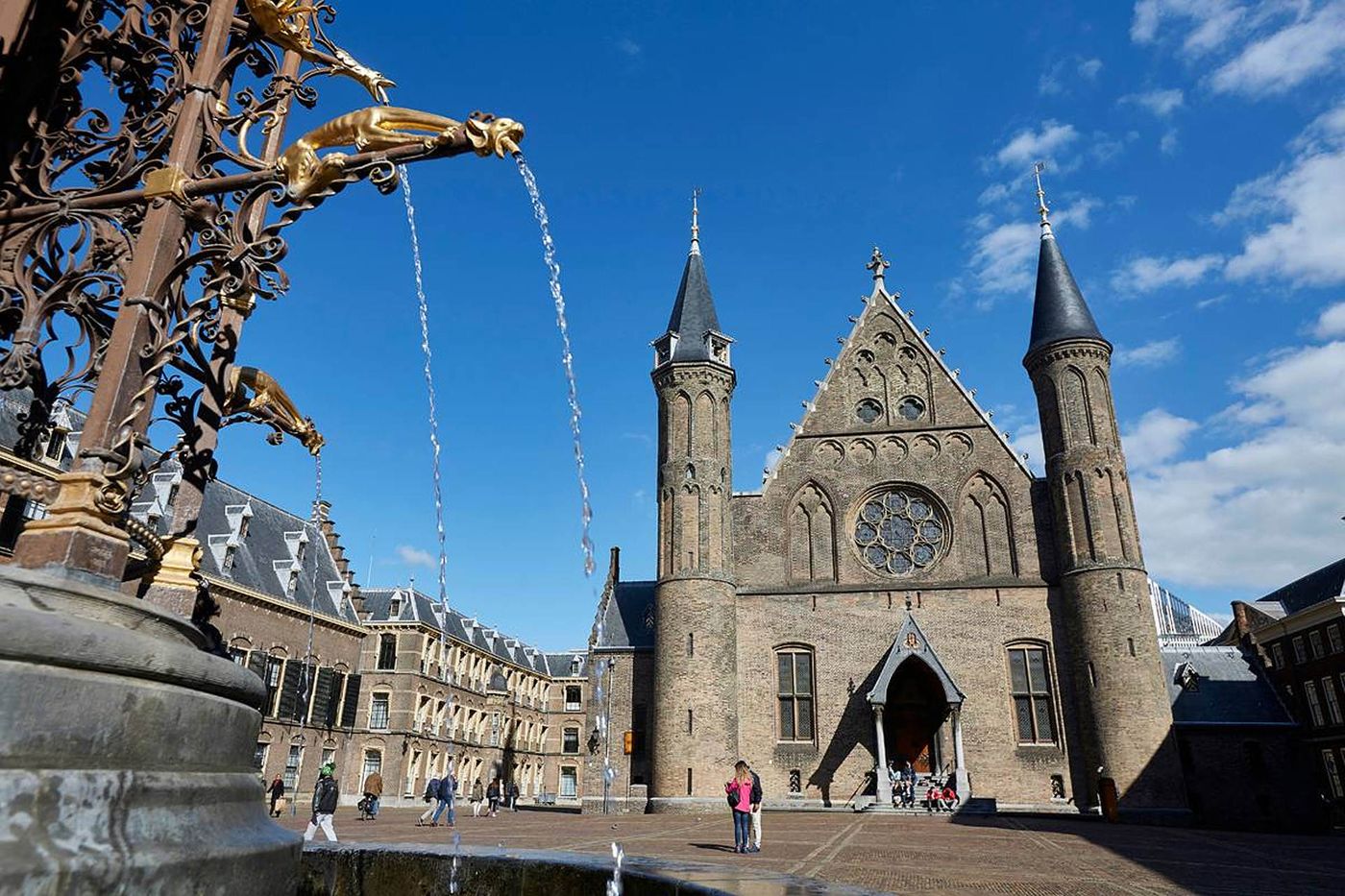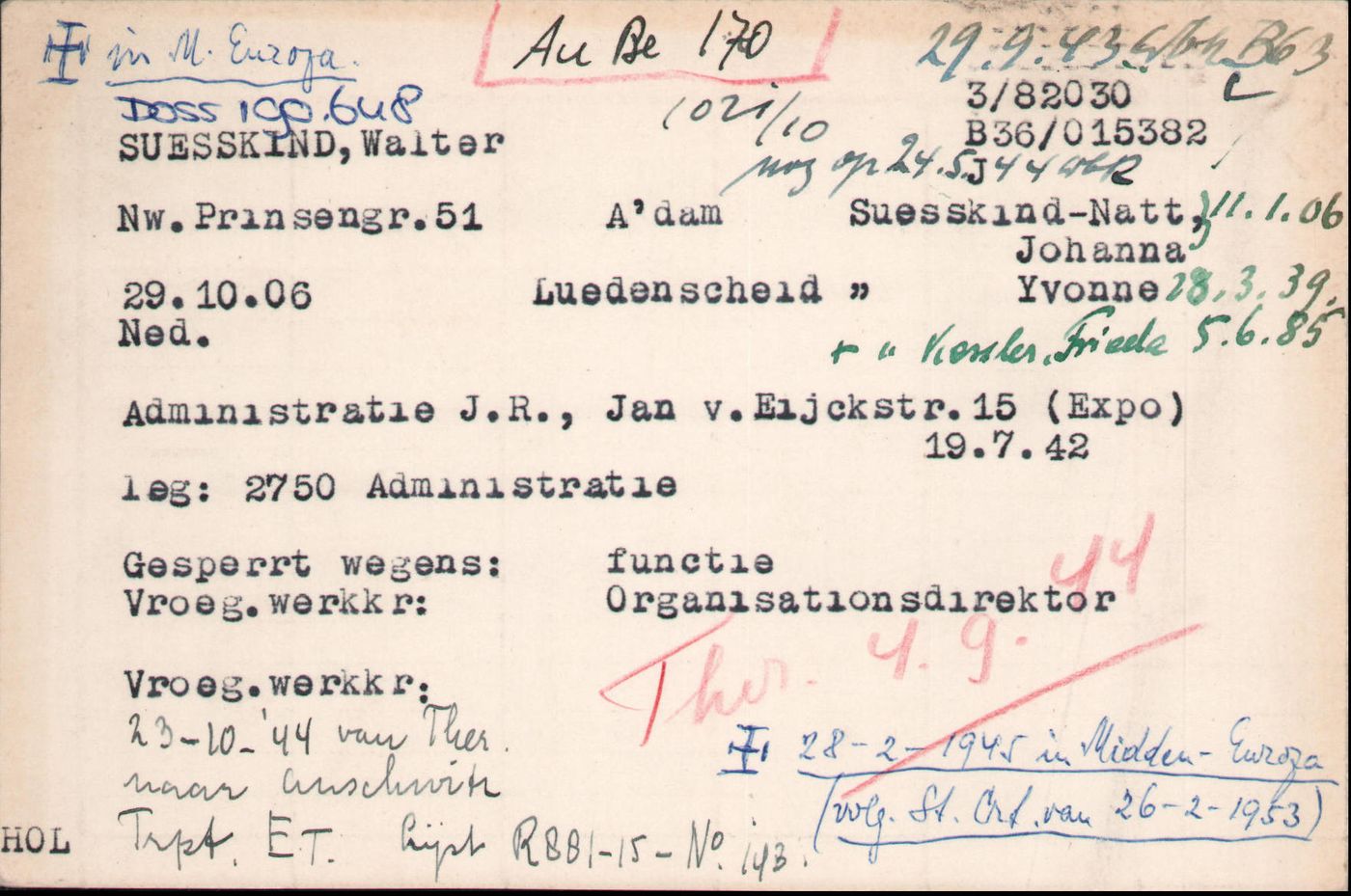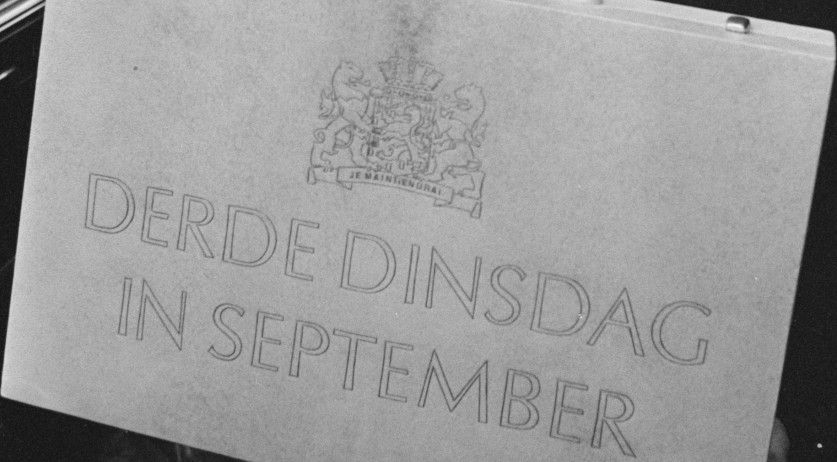Pandora's Archives 2|Trust, Doubt, Archives (Let Love Power Season 2)
The main content of this time <br class="smart">Introduction: The Vatican declassified the archives of Pius XII in advance The Netherlands Example 1: The cabinet was ineffective, the media slammed the National Archives The Netherlands Example 2: Citizens are concerned about the National Archives receiving card files of Jewish victims Addendum: Establishing Ritual, Stimulating Consensus, Forging Tradition

In late February 2020, the Vatican announced that it will open the archives of Pope Pius XII from March 2, which may be the most significant news event of 2020 from the perspective of historical archives research. At the time, the news made headlines around the world because Pope Pius XII was a controversial pope. When he was in power during World War II, many people believed that he had already known about the "final decision" of the Nazis to completely eliminate the Jews, but he remained silent and did not actively rescue them. Some even called him "Nazi Pope" for this reason. Whether it is to confirm or disprove the rumors of the "Nazi Pope", archival research is the most reliable way to gain public trust.
The decision to open the archives of Pius XII has its peculiarities compared to the archives of other popes. According to Vatican rules, a pope's archives must not be opened until 70 years after the end of his apostolic reign , and Pius XII's reign ended on October 9, 1958, the day of his death, so in theory the archives should be opened. After October 9, 2028. It is understood that the reason why the current Pope Francis announced the early opening of the Pius XII archives was based on the wishes of the retired honorary Pope Benedict XVI. It is said that Benedict XVI was a supporter of Pius XII. He hoped that after the archives were made public and researchers had access to historical materials, Pius XII could eventually be cleared of his innocence.
Benedict XVI mentioned in an interview that he was originally an archivist and archivist, but was unexpectedly promoted by the late Pope John Paul II and served as Minister of the Doctrine of the Holy See for more than 20 years. In the last few years of the old Pope's life, he also served as the head of the cardinals, and the busy work of the Holy See interrupted his research. When John Paul II died, he convened a conclave as head of the cardinals to elect the Pope. At that time, he also expected to spend the rest of his life as an archivist in the Vatican's secret archives, but he was elected as the Pope. , and then more involuntarily. When the archives of Pius XII were opened on March 2, 2020, Benedict XVI was about to celebrate his 93rd birthday. He might not be able to study the archives of Pius XII in person. The archivists who missed the chance were pinned on the scholars who came to Japan.
This wish will come to light at least in early September 2020. The French-language book The Jews of Pius XII, published by Belgian scholar Johan Ickx, largely corroborates the views of the supporters of Pius XII. Archives show that Pope Pius XII communicated with US President Roosevelt in an attempt to prevent the war from escalating, tried to influence the policies of the Third Reich through diplomatic channels, and rejected the racial discrimination laws of the French Petain regime. Pope Pius XII condemned the Catholic priests who were sympathetic to the Nazis and rushed to baptize thousands of Jews to save them from deportation.
There is a close relationship between the preservation of archival materials and people's efforts to pursue historical truth. At least so far, the public opinion we have seen on the declassification of the Pius XII archives has been quite positive, and what we are going to talk about below is an example of the archives themselves being questioned.

On January 5, 2017, the Dutch newspaper Volks published a heated discussion about the National Archives, with a news commentary titled "The National Archives should be permanently closed ". The cause of this anger was the legal declassification of the archives of the third Lüber cabinet (1898-1994) by the State Archives. Archives show that the cabinet "groaned" about the failure of the Maastricht Treaty; the cabinet discussed the former colony of Suriname at least six times, concluding that the Netherlands had pushed a politically immature colony too early (1975) Independence; the El Al air crash in Amsterdam caused a havoc in the city, and the Prime Minister ordered the flag to be flown at half-staff in mourning; the Prime Minister resigned the day before the Iraq War broke out, in fact, the cabinet had already discussed it, saying that the situation should turn into the Iraq War.
The news read that people thought the cabinet was doing important work behind closed doors, so their administrative records would not be made public until 25 years later. However, people waited patiently for 25 years, only to find that the Cabinet did nothing during the 5-year term! That being the case, the "science of the archives has seriously undermined confidence in politics. The National Archives should be permanently closed."
Faced with criticism from public opinion, Yan Plushi said in private: "What's the matter? It's the cabinet that doesn't do anything, not the National Archives. The National Archives dutifully guarded the third Lu Bo cabinet that didn't do anything. 25 years of secrecy. If the National Archives hadn't kept a handle on the cabinet's activities, what would public opinion have to criticize the cabinet today?"
This example of "public opinion explosion" once again confirms what Yan Pingshi once said, that the core of the archives is political power , the legitimacy of rule comes from the information about the past preserved in the archives, and the judgment that rule has lost its legitimacy, It is often necessary to rely on archival data for corroboration. Angry newspapers accused the National Archives, of course, to a certain extent, it was a public opinion tactic. In fact, the anger of the critics was directed at the government of that year, but the cabinet has been out of office for 25 years, and there is no way to pursue it. Rhetorical scapegoat.
So what exactly does the Dutch National Archives do with the government archives it receives?
The first working day of each year is the Open Day of the National Archives of the Netherlands, and every year a large number of government archives are legally open 25, 40 or 75 years after being transferred to the National Archives. The same was true on January 3, 2017, when a large number of journalists and citizens interested in government archives gathered at the State Archives in The Hague to get a glimpse of the contents of the declassified archives. As we mentioned before, the creation of the inventory by the archivist is the first step for the outside world to read the archives, and the inventory of the declassified archives in that year itself was as many as 711 pages.
Among the huge declassified archives , many people's eyes are focused on political secrets, such as the intriguing third Lüber cabinet archives mentioned above. Another such declassified file is the 1966 "Smelzer Night" record. This event may be little known outside Western Europe, but in the Netherlands it is a famous cabinet crisis event in the history of constitutional government: On October 13-14, 1966, the Dutch parliament's lower house lit a night battle to discuss the next year's budget. At that time, the Catholic People's Party Kui Smezer proposed a motion, causing a crisis of confidence in Congress, and the cabinet resigned the next day. Not only the Dutch political circles or political historians wanted to know what was going on at that time, but also many citizens were curious about it and looked forward to seeing the minutes of the meeting that night on the Open Day of the National Archives.
Also declassified in 2017 were the files of criminals who volunteered in the Spanish Civil War from 1936-1939 by the Ministry of Justice. Days after the files were declassified, newspapers cited a 1937 letter written by an 18-year-old when he went to fight in the Spanish Civil War. The teenager wrote in a letter to his parents:
Now I have come to Spain and was assigned to the International Brigade. I have been taught a lot here...and there are quite a few Dutch people here. We'll be on the front lines probably next week. Please don't bother trying to get me back, because that's impossible. You can only miss me.
The National Archives' Open Day gives everyone an exact date to look forward to, making January 3rd every year an almost ceremonial effect . People hear about it on TV news and in newspapers and magazines, whether it's meeting minutes that spark public outrage or letters reminiscent of war-torn years, whether it's a compliment or criticism from a commentator, or a reporter's understatement of the routine. A common sense of belonging that people share in the past and interpret the present. As the then (and current) chief archivist of the state said to the media , " A thing has to be read and transported in order to preserve it. " The function of the national archives is to ensure that citizens have access to government information, and this "Not true everywhere in the world".
Indeed, many countries are not keen to disclose information to the people. This is a matter of political philosophy and values. For a democratic country, the establishment of a national archives, the responsibilities of the archives are clearly defined by law, and the consensus of the whole people on the conditions for the preservation and decryption of government archives can be obtained through debates between society and Congress. The basis for effective operation. However, these political consensuses that must be obtained through discussion and negotiation are not universal standards. Every country/society that establishes an archives system has to go through a process of seeking consensus.
Taking the Netherlands as an example, the archives of cabinet ministries and other government agencies must be transferred to the National Archives 20 years after they are created. The benefit (of the use of the file) is time-limited , with a maximum confidentiality period of 75 years, but usually shorter.
Sometimes the very act of transferring archives to the National Archives raises questions.

In early January 2020, such news appeared in the Dutch newspapers, reminding everyone that the victim card files left by the Jewish Parliament established by the Nazis during World War II have been quietly transferred to the National Archives. The victim card file is a relic of the Holocaust of World War II (above), made before the victims were sent to death camps. Each card records a lost life. For many people who lost relatives and friends in the war, see Although it is painful to arrive at such a card, it may be the closest moment to their deceased.
After the end of the German occupation, the victim card files were discovered in Amsterdam. At first the Dutch Red Cross and the City of Amsterdam disagreed over who should keep the cards. Later, they agreed that the Hague-based Red Cross would keep the victim card files. , as part of the archives of the Red Cross Information Office.
The Red Cross received the Victim Card File in 1948 and kept it that way for a long time. In 2018, the Red Cross will transfer the entire information office archives to the National Archives, but perhaps because of the age, people did not realize at the first time that the card files of victims during the war were all transferred to the National Archives .
In January 2020, nearly two years after the files were transferred, the media revealed that the victim's card files were already under the control of the National Archives. Some people are disturbed that the government has such important wartime materials, but more people express their disappointment, because most people are not professionals and can come and go in the archives freely, maybe these cards are more suitable for Wes . Bock Transit Camp Memorial Centre , or the Jewish History Museum in Amsterdam.
Once again, it confirms the words of the National Archivist, if the documents cannot be used by others, there is no point in preserving them. There is obviously no single standard for who should keep a document, how it should be kept, and how it interacts with the outside world, even though the Open Day system of the National Archives of the Netherlands has been in operation for ten years (since 2010), every The transfer and disclosure of a file still requires the care and participation of citizens.
Regarding the public's question about the National Archives' possession of victim card files, Yan Pingshi's opinion is: "I don't think the National Archives will do anything against professional ethics, but I think people's doubts are right. First of all, on individual cases In general, the National Archives is not an authority on dealing with the Holocaust of WWII, and of course there are other archives or museums that are better suited to receive these cards. Second, the National Archives in general is part of the country, and the country needs regular Constantly being doubted . Once you don't doubt him, he's sure to fall right away."
Addendum: Establishing Ritual, Stimulating Consensus, Forging Tradition
As Ellen Debotton mentioned in his book " The Consolation of Religion ", ritual is a lesson that religion teaches us. While establishing a set of rituals, it can often also establish style, belonging and trust, right and wrong. Activities that can be creative in the religious field. In the Netherlands, whether it is the government system or the people, it is often seen to put on a ritual coat for routine business. In addition to the National Archives setting the first working day of each year as an open day, the Dutch government also created a ceremony in September. sex day.
The third Tuesday of September every year is the Netherlands' "Budget Day", nicknamed "Prince's Day", when the Dutch government announces the budget for the coming year. On this day every year, the king (or queen) will take a glass carriage to the Knights Hall in the Inner Court of The Hague (the seat of Parliament), where he will deliver a royal speech to open a new parliamentary session. The budget statement and budget briefing for the new year will be packed into a large "budget briefcase" (pictured below), which will be carried by the Minister of Finance to the House of Commons. This is the official submission of the government's policy plan for the coming year to Congress. with budget. The ceremony is much older than the National Archives Open Day, but it doesn't have too long a historical origin, but was created in 1947 by a finance minister after World War II. The minister wanted to add style and style to the shattered Netherlands after the war, and to unite the sense of commonality between the government and parliament, so he learned the trick of "packing the budget into a special briefcase" from the ceremonial Britain.
We can imagine that when the ceremony was initiated in 1947, some people must have thought that submitting the budget should submit the budget, why do they have nothing to do and work the royal family, which is a waste of public money. However, the innovation at that time has become a constitutional convention today. This ceremony has been worn for a long time, and it really gives people a different feeling. Every year, it reminds people that every cent of the national budget is debated and deliberated by the elected parliament. , not only spends money at a cost, but also shows that people's power is implemented through the design of the system.
East Asia often breaks away from local political traditions because of abrupt modernization. Westernized political activities often have more routine, less sense of history and inheritance. Perhaps Western European countries set up ceremonies to forge traditional acts, which East Asian countries can refer to. The Stone of Other Mountains.
⇩ "Prince's Day" budget briefcase: "Third Tuesday in September" is printed on the briefcase, above it is the medium-sized Dutch national emblem (the Dutch national emblem has three versions, large, medium and small), and the motto on the ribbon is "I will persist ".

The next preview <br class="smart">Pandora's Archives III How should the Netherlands face the history of slavery in the past? What role should the National Archives play in this?
Like my work? Don't forget to support and clap, let me know that you are with me on the road of creation. Keep this enthusiasm together!





- Author
- More